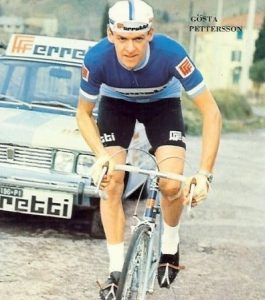In the world of professional cycling, few stories are as quietly remarkable as that of Gösta Pettersson, the Swedish rider who etched his name into history by winning the 1971 Giro d’Italia. While Italy, France, and Belgium have long dominated Grand Tour headlines, Pettersson’s victory stands as a rare and enduring achievement for Scandinavian cycling.
Born in 1940 in Alingsås, Pettersson first made his mark as part of the famed Fåglum brothers, a quartet of Swedish cyclists who dominated team time trial events in the late 1960s. Together, they captured three consecutive World Championships (1967–1969) and an Olympic silver medal at the 1968 Games in Mexico City. Gösta, the oldest and strongest of the group, turned professional in 1970 at the unusually late age of 29.
 His rise in the professional ranks was remarkably swift. In 1970, his debut season as a pro at the age of 29, Pettersson shocked the cycling world by finishing third overall in the Tour de France — a race notorious for punishing inexperience. Competing against the likes of Eddy Merckx, he showed extraordinary poise, particularly in the high mountains and time trials, where his years of discipline as an amateur shone through. His podium finish instantly marked him as a Grand Tour contender.
His rise in the professional ranks was remarkably swift. In 1970, his debut season as a pro at the age of 29, Pettersson shocked the cycling world by finishing third overall in the Tour de France — a race notorious for punishing inexperience. Competing against the likes of Eddy Merckx, he showed extraordinary poise, particularly in the high mountains and time trials, where his years of discipline as an amateur shone through. His podium finish instantly marked him as a Grand Tour contender.
Building on that momentum, Pettersson entered the 1971 Giro d’Italia as a quiet favorite. Riding for the Italian Ferretti team, he blended into the field without the fanfare surrounding native stars, but quickly proved himself with a string of steady performances. He excelled on the grueling ascents of the Dolomites and maintained his composure under pressure. While he didn’t win many individual stages, he was consistently near the front — a hallmark of his style.
The battle for the maglia rosa intensified in the final week, with heavyweights like Felice Gimondi, a former winner, and Belgian all-rounder Herman Van Springel mounting serious challenges. But Pettersson’s strength in the time trials and his unshakable pacing allowed him to defend his lead and secure overall victory by just 30 seconds, one of the narrowest margins in the race’s history. It was a calculated and disciplined triumph — the kind that highlighted not only physical ability, but also tactical intelligence.
With this win, Pettersson became the first Scandinavian rider to win a Grand Tour, a groundbreaking moment that resonated beyond Italy and inspired a generation of Nordic cyclists.
Pettersson was not known for dramatic attacks or flamboyant racing — instead, he built his success on quiet strength, tactical intelligence, and calm under pressure. His Giro win remains a landmark achievement not just for Sweden, but for all cyclists from nations outside the traditional European powerhouses.
After a brief but impactful professional career, Pettersson retired in the mid-1970s.